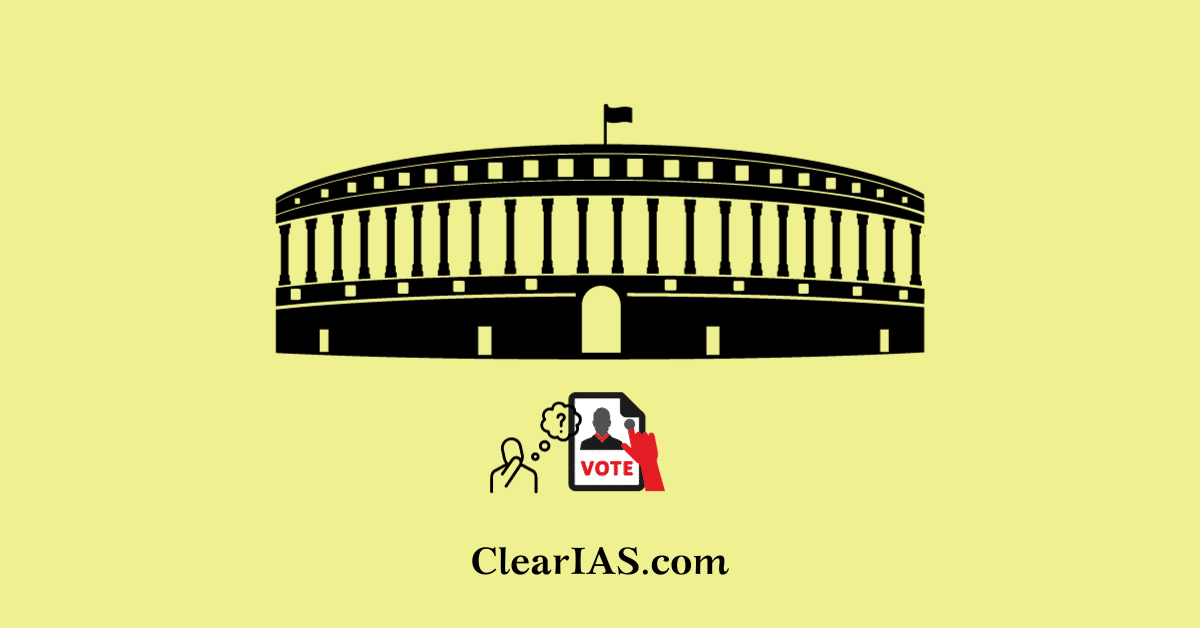 In Indian democracy, the term of an MP or an MLA is 5 years (the term of the house). There exists no recourse for the electorate if they are unhappy with their elected representative. What if they have a right to recall legislators before the end of the term?
In Indian democracy, the term of an MP or an MLA is 5 years (the term of the house). There exists no recourse for the electorate if they are unhappy with their elected representative. What if they have a right to recall legislators before the end of the term?
What is Right to Recall?
Recall refers to the condition when a person who has been elected be removed from his office before the end of his term by a direct vote.
Right to Recall (RTR) confers the electorate a right of recall that can be initiated by any elector within a particular constituency through a recall petition signed by not less than one-fourth of the total number of electors. It is found in many contemporary constitutions. Canada and the US also allow the right to recall on grounds of misfeasance and misconduct.
Should we recall the representatives we elected?
There are numerous instances in India which could demonstrate the said proposition, for instance:
- Sri Prakash Jaiswal has openly rejected the findings of the CAG report on the coal-gate scam.
- Vilasrao Deshmukh has allegedly been involved in the infamous Adarsh Society scam.
- A. Raja had engaged in massive corruption during the allocation of 2G-spectrum etc.
It this backdrop, there has been a wide-spread demand to have a right to recall or a right to de-elect our elected representatives.
The progress of ‘Right to Recall’ in India
- In 2016, Varun Gandhi introduced ‘The Representation of the People (Amendment) Bill‘ in Lok Sabha to recall MPs, MLAs for the non-performance. However, the concept of Right to Recall was not a new one in India.
- The concept of “Rajdharma” during the Vedic times is similar to the concept of Right to Recall. In this system, the king was removed when there is a lack of effective governance.
- In 1944, M.N. Roy proposed the decentralisation and devolution of governance which will allow for the election and recall of representatives.
- The ‘Right to recall’ was stated by Somnath Chatterjee when he said that it can be used for accountability purposes.
- The Representation of Peoples Act (RPA) 1951 talks about Right to Recall. RPA does not account the ground of incompetence or the dissatisfaction of the electorate as the ground for recall and vacation. It only provides for the vacation of the office upon the commission of the certain offence.
- Right to recall exists in the local bodies of Bihar, Madhya Pradesh, and Chhattisgarh.
The Judiciary’s take on the Right to Recall

In the case of Mohan Lal Tripathi Vs. District Magistrate, Rae Bareilly and Ors., the Supreme Court of India opined that:
“A President who is elected by the entire electorate when removed by such members of the Board who have also been elected by the people is in fact removal by the electorate itself. The Board represents the entire electorate as they are representatives of the people although smaller in the body. Such provision neither violates the spirit nor purpose of recall of an elected representative.”
However, the Allahabad High Court later in the case of Smt. Ram Beti Vs. District Panchayat Raj Adhikari and Ors. advised that the provisions of removal of the representative could be made more stringent by restoring the old provisions of recall by Gram Sabha i.e. by the electors themselves.
The position taken by the Supreme Court appears to be quite dangerous and therefore, the advice was given by the Allahabad High Court indeed holds substance. Therefore, the interests of justice and fairness demand that the de facto power to remove the representatives should be with the electorate itself and not the representatives of the electorate.
What are the advantages of Right to Recall?
- It gives the power to ensure vertical accountability of a person in a democracy.
- Criminalization of politics would reduce.
- Raise inclusiveness and engender direct democracy.
- Election promises would be fulfilled by the representative due to the apprehension that he may be kicked out if he does not keep promises.
- The free and fair election is the very essence of the democracy. The people should decide according to their confidence on the elected one who should be elected and who can be removed.
- To deepen democracy, the right to recall must be given hand in hand with the right to vote.
- Having the system of recall will deter candidates from spending crores of money in campaigning for the elections because they will always have a fear of being recalled.
What are the disadvantages of Right to Recall?
- Right to recall creates an additional burden on the Election Commission.
- It will also place undue pressure on limited resources such as manpower, time, money etc.
- The criteria provided for recall viz., the dissatisfaction of the electorate with the performance of the candidate, is vague and provides immense scope for misuse.
- The representative would be under constant pressure to work the way people want him.
- There is an uncertainty of the time period he would be serving the public. This uncertainty would make it hard to make plans/policies which yield substantial results in long-term.
- Political rivals would make an issue out of smallest of the mistake of the representative and demand a recall election.
- Representatives would keep spending lots of money just to please people.
- There will be a state constant political turmoil and politicians would be busy saving seat instead of working for development.
- It is contentious as to whether the right to recall will instil vertical accountability. For instance, the existence of local self-government has not automatically led to the improvement of vertical accountability across India.
- In a polity, which is yet to have an efficient and impartial bureaucracy, it is contentious as to whether the right to recall has met expectations vis-à-vis the limited number of local self-government frameworks which provide such right to the electorate (as in the case of Madhya Pradesh).
- Even though the right to recall is intuitive, it must be rejected as it does not satisfy the test of pragmatism.
- Primarily, it leads to ‘excess’ of democracy and this will hamper the independence of the legislators.
Way forward
- Granting of Right to Reject is a balanced option. It is safer and would not lead to constant political upheaval. Parties would be forced to give a ticket to a candidate with clean and good past record. Good representatives can actually be expected to keep up their performance for next five years.
- Legislative change is required to bring about right to recall.
- Built-in safeguards should be there.
- However, the right to recall should not be misused to harass the elected representatives.
- The electronic voting procedure should be used.
- It should be ensured that the representatives cannot be recalled by a small margin of voters.
- It should represent the mandate of the people.
- Moreover, any elected person when found to be engaged in the corrupt practice or any misdeed can be removed from his position.
Article by: Ipsita Mishra






all the disadvantages are simply non sense. and varun gandhi’s right to recall draft is bigger than this nonsense.
and all this is done to hijack and destroy the right to recall movement from right to recall group ( founder: rahul chimanbhai mehta) like ford foundation agents anna and arvind kejriwal who have tried this earlier but were not fully successful to destroy the movement.
if any one wants to know about right to recall and other proposed law like jury system, wealth tax ,etc. then pls see videos on YouTube on right to recall group channel.
for law drafts and other details about this movement : rahulmehta.com/301.h.htm
but will never be implemented in india any time soon
Good info about Right to Recall. A long movement is required to achieve this holy goal of democratic decentralization and giving power to people.
In procedure of election reforms “Right To Shift/transfer vote or cast vote at the same time when recall is done should be given
to unsatisfied voters of public
representatives.
This can be done by linking Adhar’s biometric identification to casting votes. Many countries have are using biometrics for vote registration etc.
As per this concept When 51 percent voters of existing representative shift their votes to other candidates then the candidate with highest votes will become voter’s representative after passage of six months period.
This lapse period of six months is given to voters and to representatives for changing their stand on cause for which shift in votes has taken place.
Even after passage of lapse period of six months, voters still stick to their stand on shifting their votes then candidate with highest votes will become their next representative.
Shifting of 51% votes through biometric identification can be considered as automatically triggering off the recall application signed by public.